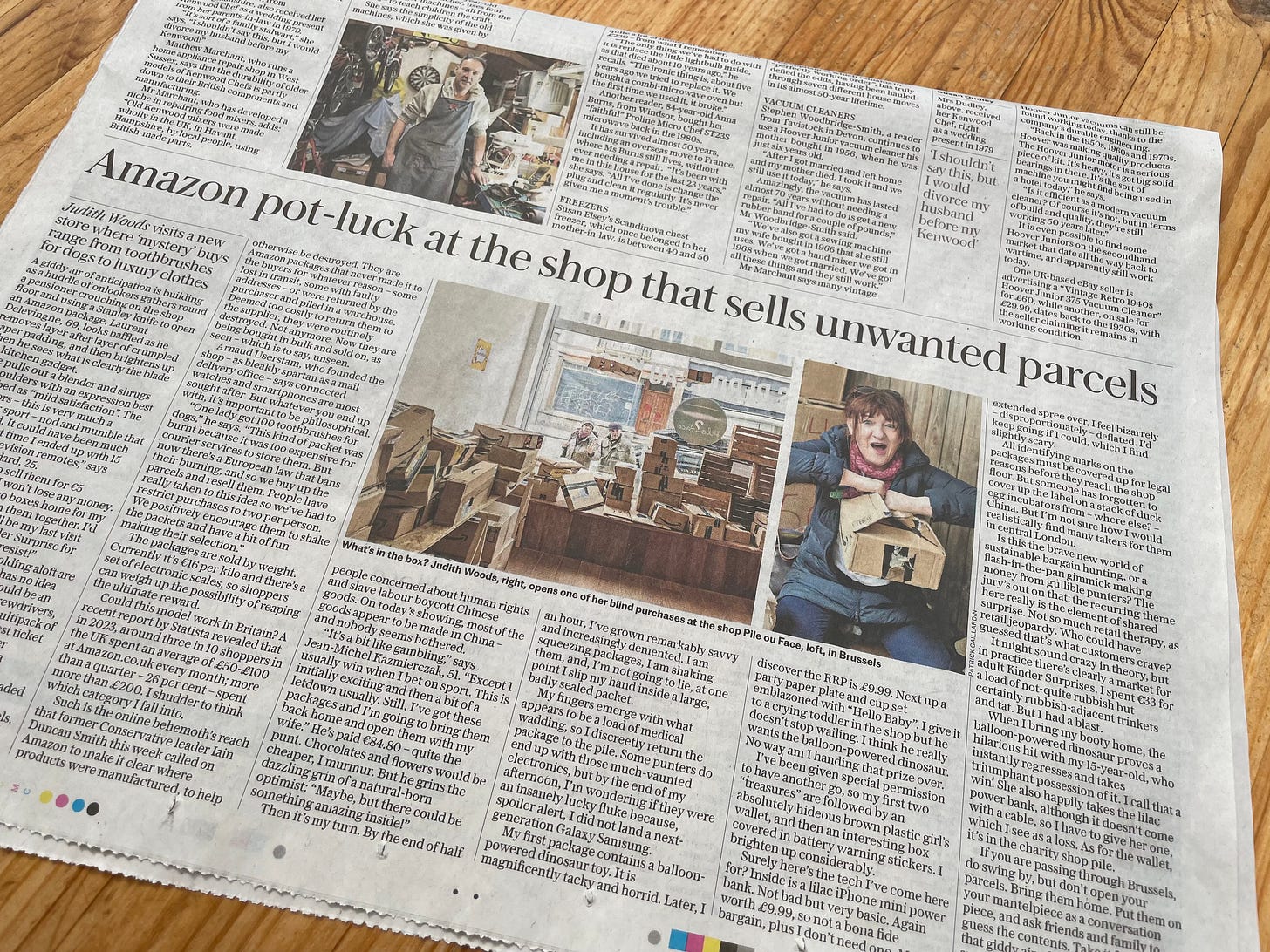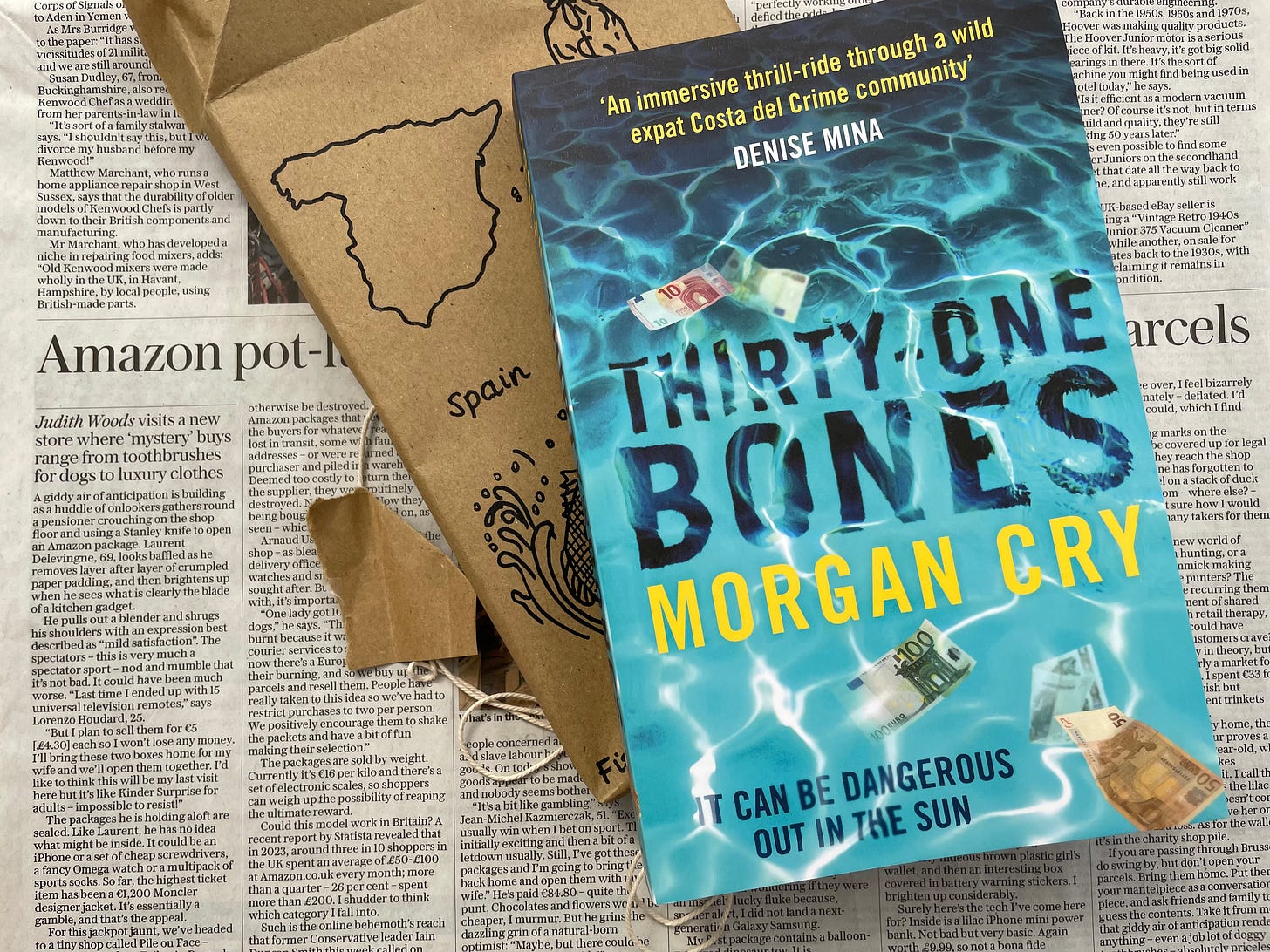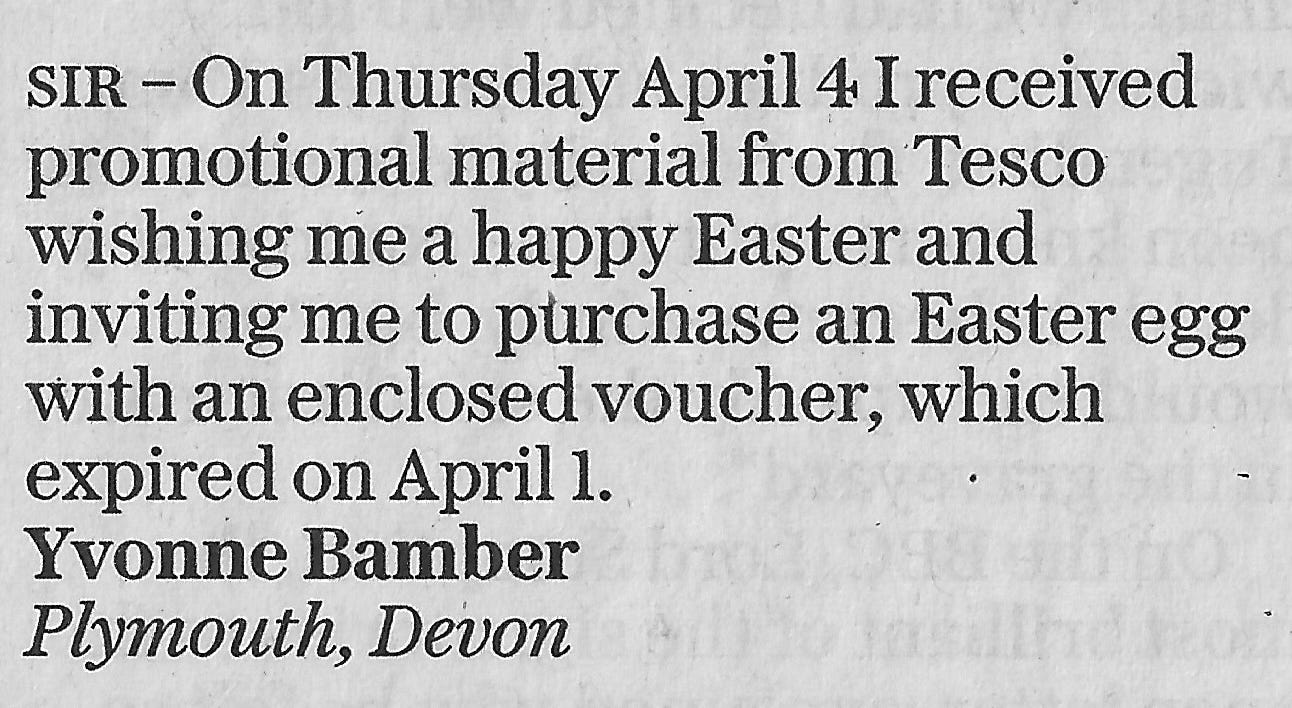141. ✒️ A letter to Terry: reply #24-08
Bare-naked post-atoes, the efficiency of Royal Mail and the fun of mystery parcels.

This is the latest letter in my regular, informal correspondence with Substacker and fellow Brit Terry Freedman, in which we take turns every other Wednesday to delve into the things that British people talk about the most. So that you can explore these unashamed clichés for yourself we’re inviting you to read our letters over our shoulders.
My next ‘Dear Reader, I’m lost’ post will of course be published on Saturday.
Dear Terry,
Many thanks for your latest communication, which I read with interest, as always. In it, I was staggered to learn of that letter which had been delivered a whopping 107 years after it had been posted. Of course, I’ve never claimed to a creditor that ‘the cheque is in the post’, but given that there appears to be written evidence of letters being lost in the post for longer than the sender’s lifetime, well, one might feel that one could get away with non-payment of bills indefinitely.
NOTE: As a responsible member of society I neither recommend nor condone this course of action. ⛔️
Your ‘let’s see whether Royal Mail will deliver a peeled potato wearing only an address label, not an envelope’ experiment has reminded me of a similar exchange of corres-non-dence between two of my university friends. One had started the ball rolling by posting an empty yoghurt pot – sans envelope – to her pal in the neighbouring college, and duly received an equally-naked – and empty – Jaffa Cakes packet in return. Despite the frustrations experienced, I am sure, by the service, it wasn’t Royal Mail itself which had eventually put a stop to the shenanigans but the staff whose job it was to hand over parcels to any recipients who had spotted their name on the parcel list on the clipboard at the Porters’ Lodge.
The arrival of a single rugby sock – a clean one, no less, and in the college colours of the sender – had at last been more than the chaps could bear, and the two students responsible for the silliness were called to a meeting. The porter representing College A told them that if they’d sent the items through the internal university mail – a free service – they would have saved on stamps, while the College B porter snorted that anything like that arriving via internal mail on his watch would have been thrown away immediately.
The perpetrators of the postal prank moved on to more impressive things – although legal restrictions require me to state that rumours of their involvement in the subsequent traffic light relocation scandal which I had mentioned in a previous letter (link below) were never verified.
A thought, Terry: might you have avoided the need to cover your post-ato in Sellotape if you had simply left it unpeeled?

Jim tells me that one of his friends once sent him a housewarming gift in the form of a foot-long length of 2 x 1 carpentry timber, the address – starting with the line ‘DIY Cottage’ – written directly onto the wood in permanent marker, a stamp correctly affixed to the top right-hand corner.
‘I wouldn’t’ve minded so much,’ Jim said, ‘but there was no carpet in the hallway at the time, and it nearly gave me a heart attack when the wrapperless plank clattered through the letterbox and onto the bare floor.’
Jim used the plank for a shelf in the end, leaving the address and stamp visible. I wonder if it’s still there?
🤔
I came across a brilliant story by Judith Woods in the weekend newspaper about a shop in Brussels called Pile ou Face (Heads or Tails) selling ‘unopened, unwanted and unidentifiable goods that would otherwise be destroyed. They are Amazon packages that never made it to the buyers – some lost in transit, some with faulty addresses – or were returned by the purchaser. Deemed too costly to return them to the supplier, they were routinely destroyed. Not any more. Now they are being bought in bulk and sold on, as seen – which is to say, unseen.’
Pile ou Face prices the unopened parcels by weight, with buyers having no clue what their chosen boxes might contain until they have parted with their cash.
Terry, this fascinated me. I’m not much of a gambler, and I’m not keen on spending money on a complete lottery of an anonymous box containing something which is likely to be neither use nor ornament.
I do however, have form buying ‘mystery books’, and reading the newspaper article reminded me of one on my shelf which I hadn’t yet unwrapped.
The first mystery book I’d purchased cost me a princely pound from a charity bookshop, and I was thrilled to bits with it because it was one I would have chosen if even if I’d been able to see it first. You might remember my post about it at the time.
I wondered which book this brown paper wrapping with its beautifully-drawn clues as to its subject matter might be concealing? Well, here it is:
I hadn’t come across the author before, but having read the blurb on the back – and Ian Rankin’s three-word verdict ‘sweaty, seedy fun’ – I can’t wait to make a start!
When Daniella Coulstoun’s estranged mother Effie dies in Spain under suspicious circumstances, she feels it’s her duty to fly out for the funeral.
On arrival, Daniella is confronted by a dangerous group of expat misfits who claim that Effie stole huge sums of cash from them in a multi-million property scam. They want the money back and Daniella is on the hook for it.
When a suspicious Spanish detective begins to probe Effie’s death and a London gangster hears about the missing money, Daniella faces threats on every front. With no idea where the cash is and facing a seemingly impossible deadline, she quickly finds herself out of her depth and fighting for survival in a strange and terrifying world.
🫣
Thank you for your recommendation to read The Real Jane Austen: A Life in Small Things by Paula Byrne. When reading Emma recently I loved this superb exchange between the title character and Mr Knightley in which they discussed their two very different views on receiving letters:
‘…I cannot expect that simply growing older should make me indifferent about letters.’
‘Indifferent, Oh! No – I never conceived you could become indifferent. Letters are no matter of indifference; they are generally a very positive curse.’
‘You are speaking of letters of business; mine are letters of friendship.’
‘I have often thought them the worse of the two,’ replied he coolly. ‘Business, you know, may bring money, but friendship hardly ever does.’
Terry, this brings me to wonder how much value you friend had placed on your post-ato. Did you charge them for sending it, or did they bill you for the trouble they took in receiving a naked, grubby spud the day after it had been peeled⸮⸮
(As you can see from my efforts to reverse – and indeed duplicate – the question mark, this question is both rhetorical and ironic. Yes, I’d read your footnote.)1
With the recent rise in the price of stamps there has been plenty of discussion in the recent press about the efficiency (or, in some cases, not) of deliveries nowadays compared to fifty years ago. Here’s what Yvonne Bamber had to say about a delivery in her letter to the editor of the Daily Telegraph in the edition published on Saturday, April 6th:
Former postman David Bainborough describes the comparative efficiency of delivery in the 1970s:
What would he have thought about having to deliver a naked potato or a single, wrapperless rugby sock, I wonder?
Use an envelope, Terry, for goodness’ sake!
All the very best, as always,
Rebecca
If you’ve enjoyed reading this letter to Terry, please let me know by clicking the heart. Thank you! My next ‘Dear Reader, I’m lost’ post will be published on Saturday.
You’ll find the rest of my letters in this series by clicking the ‘Letters to Terry’ tab on the top bar of my home page. Terry and I take it in turns to write to each other on alternate Wednesdays, and I really enjoy our light-hearted correspondence! You can access both Terry’s letters and mine using the index below:
Check out Terry's fabulous newsletter, and to make sure you don’t miss his reply to this letter next week, why not subscribe?
Last but not least, do please share and subscribe for free! Thank you!
This is a reverse question mark, invented by Henry Denham in the 16th century for the purpose of indicating a rhetorical or ironic question.
Footnote taken from this post by Terry Freedman:













Only Rebecca Holden could write an entire article related to the post - office and draw us in like a magnet. What a creative spirit you have! Loved this.
I’ve been very tempted to post you tea (not taters) in follow up to some comments we’ve exchanged recently, and especially after these letters!